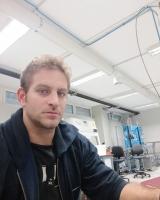PhD Thesis Defence Presentations - Dimitrios Ladakis

Abstract (Περίληψη)
The scope of this thesis is the evaluation of spent sulphite liquor (SSL) as the main fermentation carbon source for succinic acid (SA) production in continuous cultures. Subsequently, a techno-economic analysis of a process that produces SA from SSL under continuous and fed-batch fermentations strategies is presented. The purpose of the techno-economic analysis is to investigate the economic feasibility of the succinic acid that derived from the utilization of SSL and factors in which the succinic acid production cost has high dependence.
SSL is the liquid by-product stream derived from the acidic sulphite process of mainly hardwoods. This waste stream contains solubilised lignin in the form of lignosulphonates and sugars which arise after hemicelluloses degradation. The type of the using wood and the processing conditions employed in the plant are the two main elements that define the sugars contained in SSL. In this study the waste stream that was used resulting from the pulp and paper industry of the Eucalyptus globulus wood.
This work was initiated with the evaluation of SSL as substrate in continuous cultures using the wild-type rumen bacterial strains Actinobacillus succinogenes and Basfia succiniciproducens. These strains are considered as two of the most promising strains for industrial implementation. The cultures were initially carried out at constant dilution rate (0.04 h-1) and varying initial commercial xylose concentrations (23-55 g/L) or constant xylose concentration (40 g/L) and varying dilution rates (0.02-0.25 h-1) showing that dilution rates of 0.02-0.15 h-1 led to satisfactory succinic acid production by both microbial strains. In continuous cultures using nanofiltrated SSL, maximum yields of SA were achieved at dilution rate of 0.02 h-1 (0.48 g/g for A. succinogenes and 0.55 g/g for B. succiniciproducens) while maximum values of productivity were obtained at dilution rate of 0.04 h-1 in the case of A. succinogenes (0.67 g/L/h) and 0.1 h-1 (1.6 g/L/h) in the case of B. succiniciproducens.
During the fermentation of both strains observed biofilm creation at the solid parts of the reactor. Due to this the biomass concentration was impossible to measure, so the biomass concentrations at different dilution rates for both strains was estimated using metabolic flux analysis.
In the techno-economic analysis of SA, the design of the entire SA production process was based on data obtained from experimental results and the material and energy balances were carried out using spreadsheets and validated through UniSim software. Bacterial fermentations were conducted with Basfia succiniciproducens as the SA producer. The downstream design based on direct crystallization process using ion-exchange resins for acidification step, with final purified SA crystals equal to 99% and with a recovery yield of 97% which achieved by recirculation of the side streams in downstream process. Process simulation was performed for a range of plant capacities, 5, 30, 100 kt of SA per year. The study indicated the feasibility of fermentative SA production from SSL and the minimum selling price (MSP) for 10% annual return on investment was calculated at 2.70 $/kg for continuous and 3.06 $/kg for fed-batch strategy when commercial nitrogen sources were applied. The MSP was reduced to 2.16 $/kg and 2.76 $/kg for continuous and fed-batch respectively assuming that commercial nitrogen sources are substituted with hydrolysates of corn steep liquor (CSL). The fermentation and evaporation units were identified as significant capital and operating cost contributors and therefore the optimization of bioreactor geometrical characteristic and alternative more cost-effective evaporation technics should be considered in future research.
Speakers Short CV (Σύντομο Βιογραφικό Ομιλητή)
Education
2014
MSc. Degree from the Department of Food science and human nutrition, Agricultural University of Athens in the field of Food Biotechnology and biorefinery.
Dissertation Thesis Title: “Study and design of the succinic acid production bioprocess from paper and pulp industry wastes”.
2009
BSc Degree from the Department of Chemical Engineering, University of Patras.
Teaching Experience
- Process and Plant Design
- Plant Design Laboratory
